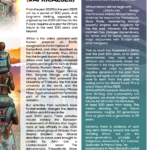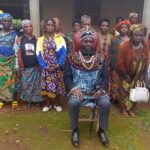An essay on the wrong homogenisation of literatures from the African continent on the Western literary landscape — from Nsah Mala
There is a proliferation of “African Literature” as a name for departments or courses within African Studies, not only in many universities in the western world, especially in Europe and North America, but also in universities in some African countries such as Cameroon, Nigeria, and South Africa. In a number of Euro-American universities, African literature is sometimes offered as a course in departments of English Literature.
Last month, I delivered a guest lecture on “African Literature” at the University of Copenhagen. But I deliberately framed my lecture as an “Introduction to African Literatures” — notice the plural marker.
The name “African Literature” is quite problematic for a number of reasons. To begin, it is an unreciprocated act given that almost no university in an African country calls a course or department in blanket terms such as European Literature or North American Literature. On the contrary, you will often hear of courses and programmes like French Literature, Francophone Literature, British Literature, Commonwealth Literature, American (US) Literature, Canadian Literature, and so forth.
In addition, “African Literature” perpetuates the homogenisation of the African continent as if it were one single country. Africa, it should be noted, is the second-largest continent in the world. With at least 54 countries, depending on how you count, Africa’s cultural and linguistic diversity is unmatched by any other continent.
As a result, it is important to pin down the various literatures from the African continent to specific countries of origin. In this way, it would be proper to talk about, for example, Algerian Literature, Angolan Literature, Ghanaian Literature, Equato-Guinean Literature, DR-Congolese Literature, Kenyan Literature, Zambian Literature, and the list continues.
Furthermore, due to the European colonial domination of Africa in the nineteenth and twentieth centuries, the linguistic diversity of literatures from Africa should be taken into consideration. In this regard, it may be more useful to distinguish, for example between Anglophone Tanzanian Literature and Swahili Tanzanian Literature, between Anglophone Cameroonian Literature and Francophone Cameroonian Literature, between Arabic Moroccan Literature and Francophone Literature, and so on.
In other words, distinctions could be made between the literatures of African countries along the lines of languages inherited from colonisation such as Arabic, English or French, and indigenous African languages such as Zulu, Lingala, Hausa, Amharic, Bamum, Fulfulde, Mbessa, etc. Cameroon, as a case in point, has English and French as official languages, but about 300 indigenous languages. There are over 530 languages spoken in Nigeria and about 230 languages spoken in the Democratic Republic of Congo (DRC).
This linguistic diversity translates into the diversity of African literatures, both oral and written, given that indigenous African languages, many of which are still undocumented, are bearers of very rich oral traditions: folktales, songs, riddles, proverbs, dirges, rituals, to name but a few.
Meanwhile, most courses and programmes labelled as African Literature in Euro-American universities end up teaching only canonical texts in English. Rarely do they include texts in other languages like French or Spanish, or indigenous African languages like Lamnso, Khana or Swahili. Therefore, even within individual African countries such as Cameroon and Kenya, for instance, it would be appropriate to talk about Cameroonian literatures and Kenyan literatures in plural.
In view of this, it is therefore important to go beyond the homogenising African Literature label and instead talk about African Literatures in plural. The best option is to break down literatures from the African continent into their respective countries of origin, taking into consideration other factors such as language of writing — colonial versus indigenous languages — and oral versus written literatures.
Henceforth, it is crucial to highlight the heterogeneity of African literatures and avoid the homogenisation trap because there is no such thing as African literature in the singular.
NOTE: The Danish version of this article was first published in the Danish weekly broadsheet newspaper called Weekendavisen in 2022.
Nsah Mala (born Kenneth Nsah) is an award-winning poet, writer, children’s author, journalist, translator and interdisciplinary scholar from Cameroon. He hails from Mbessa Kingdom in Anglophone Cameroon and writes in English and French and sometimes in his indigenous Mbessa language. Nsah is the author and/or editor of numerous volumes of poetry and children’s books, including Bites of Insanity (2015), If You Must Fall Bush (2016), Constimocrazy: Malafricanising Democracy (2017), Les pleurs du mal (2019), Explore Animal Sounds with Little Nain (2022), Andolo the Talented Boy with Albinism (2022), Little Gabriel Starts to Read, and Corpses of Unity — Cadavres de l’Unité (2020). His poetry and short fiction appear in many magazines and anthologies across the globe, among which are Kalahari Review, Parousia Magazine, Tuck Magazine, Red Poets, Scarlet Leaf Review, Tiger Moth Review, e-Cahiers Malraux, Wales-Cameroon Anthology, Ashes and Memories — Cendres et mémoires, Bearing Witness: Poems from a Land in Turmoil, and Redemption Song and Other Stories — Caine Prize Anthology 2018. An alumnus of the Caine Prize Writing Workshop, Nsah Mala has won literary prizes in Cameroon and France. Nsah obtained a PhD in Comparative Literature and Environmental Humanities from Aarhus University (Denmark) in 2022. His doctoral thesis was entitled “Can Literature Save the Congo Basin? Postcolonial Ecocriticism and Environmental Literary Activism.” The thesis has won two prizes so far, including the prestigious Prix de thèses francophones en Prospective (Prize for Francophone Theses in Foresight and Futures Studies) from Fondation 2100 (France) and Agence Universitaire de la Francophonie in 2022. Nsah is widely published in peer-reviewed journals and edited volumes on issues such marginality, migration, climate and environment, theatre and sustainability. After a short postdoctoral position at Radboud University (Netherlands), Nsah is currently a Postdoctoral Teaching and Research Fellow (ATER) at the University of Lille (France).
NOTE: This article was first published by Kalahari Review on 19 September 2023.






